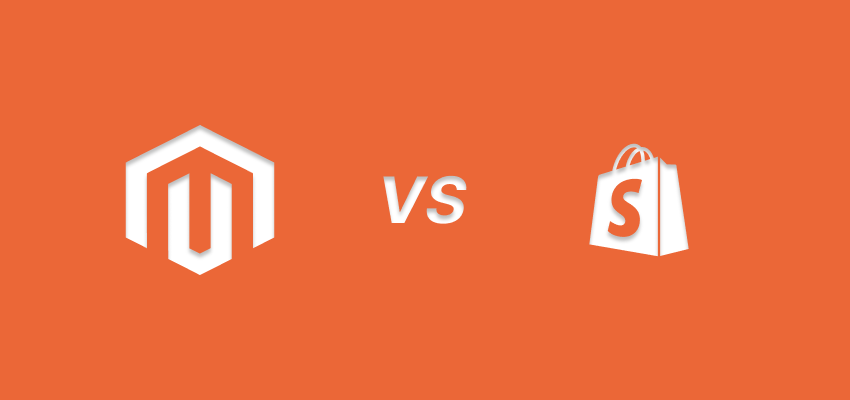Magento vs Shopify? Which is better for you
Magento and Shopify are two popular e-commerce platforms that use by businesses to build and manage their online stores. Shopify is a cloud-based platform that provides a simple and user-friendly solution for small and medium-sized businesses. While Magento is an open-source platform that offers more advanced features and customization options for large enterprises. Both platforms have their own unique set of benefits and limitations. The best choice depends on the specific needs and goals of the business.
Shopify
It is a cloud-based e-commerce platform that provides businesses with an all-in-one solution for creating and managing their online stores. Launched in 2004 and has since become one of the most popular e-commerce platforms. Over 1 million active businesses using this platform.
It offers a wide range of features and tools to help businesses build and manage their online stores. It includes a user-friendly interface, customizable themes, a built-in shopping cart, mobile optimization, and 24/7 support. Additionally, It also integrates with various payment gateways, such as PayPal and Stripe. Gateways make it easy for businesses to accept payments from their customers.
Additionally, Shopify offers a wide range of third-party apps and plugins to extend the functionality of the platform. It includes marketing and advertising tools, shipping and fulfillment solutions, and more. With its wide range of features, it is ideal for small businesses and those just starting out with e-commerce.
Features and benefits of using Shopify
Shopify offers lots of features and benefits that make it a popular choice for businesses looking to start a store. Here are some of the key features and benefits of using Shopify:
User-friendly interface: Shopify has a user-friendly interface that makes it easy for businesses to build and manage their online stores.
Customizable themes: Shopify offers lots of customizable themes to help businesses create an online store that matches their brand image.
Built-in shopping cart: Shopify includes a built-in shopping cart that allows customers to add products to their cart. To complete their purchases in one seamless process with this.
Mobile optimization: Shopify optimize for mobile devices, making it easy for customers to shop from their smartphones and tablets.
Integrations with payment gateways: Shopify integrates with a variety of payment gateways, including PayPal and Stripe. Make it easy for businesses to accept payments from their customers.
Third-party apps and plugins: Shopify offers lots of third-party apps and plugins to extend the functionality of the platform. It includes marketing and advertising tools, shipping and fulfillment solutions, and more.
24/7 support: Shopify provides 24/7 support to help businesses with any questions or issues they may have.
Scalable: Shopify is a scalable platform that can accommodate the growth of a business. It makes a good choice for businesses of all sizes.
In conclusion, Shopify provides businesses with a comprehensive e-commerce solution. It is user-friendly, customizable, and packed with features to help businesses grow and succeed online.
Suitable businesses for Shopify
Shopify is suitable for lots of businesses, but it is well-suit for small and those just starting out with e-commerce. Here are some of the types of businesses that are well-suit for Shopify:
Small businesses: Shopify is ideal for small businesses that want to launch an online store quickly and easily. No need to worry about the technical aspects of setting up an e-commerce website.
Startups: Shopify is a popular choice for startups because it provides a comprehensive e-commerce solution. It is easy to use and requires no technical expertise.
Online retailers: Shopify is suitable for retailers who want to sell lots of products and services from physical to digital.
Direct-to-consumer brands: It’s good for direct-to-consumer brands that want to sell their products directly to consumers without going through retailers.
Dropshippers: Shopify is a popular choice for drop shippers because it integrates with various fulfillment services. It makes it easy to manage inventory and shipping.
Multi-channel sellers: Shopify is a good choice for businesses that sell products through multiple channels. It integrates with a variety of marketplaces, including Amazon, eBay, and more.
In conclusion, Shopify is a suitable platform for businesses of all sizes and types. Still, it is particularly well-suit for small businesses and those just starting out with e-commerce.
Shopify Pricing and plans
Shopify offers a range of pricing plans to suit different businesses’ needs and budgets. Here are the main Shopify pricing plans:
Basic Shopify: This is the entry-level plan and it costs $29 per month. It includes features like a fully functional online store, a secure shopping cart, and 24/7 support.
Shopify: This is the mid-tier plan and it costs $79 per month. It includes features like advanced reporting, gift cards, and professional reports.
Advanced Shopify: This is the top-tier plan and it costs $299 per month. It includes features like advanced custom checkout, third-party calculated shipping rates, and advanced report builder.
In addition to these plans, Shopify also offers a Shopify Lite plan. It costs $9 per month and includes features like buy buttons and a point-of-sale system.
It’s important to note that Shopify charges transaction fees for each sale made through the platform. The transaction fee varies depending on the payment gateway used, but it ranges from 2.0% to 2.9% + 30 cents.
Businesses can choose the pricing plan that best suits their needs and budget. They can upgrade or downgrade their plan as their business grows or changes. Additionally, Shopify offers a 14-day trial to help businesses try out the platform and see if it’s right for them.
Magento
Magento is an open-source e-commerce platform that provides businesses. It’s a wide range of features and customization options for building and managing their online stores. Launched in 2008, Magento has become one of the leading platforms for enterprise-level e-commerce. Additionally, it offers a robust set of tools for catalog management, payment and shipping options, customer management, and more. With a large community of developers and integrators, Magento knows for its flexibility and scalability. It allows businesses to grow and evolve as their needs change. Whether you’re a small business or a large enterprise, Magento offers a versatile and powerful solution for your e-commerce needs.
Features and benefits of using Magento
Magento offers a range of features and benefits for businesses looking to build and manage their online stores. Some of the key benefits include:
Customization: Magento is an open-source platform, which means businesses have access to a wide range of customization options. It includes the ability to create unique themes and extensions.
Scalability: Magento designs to handle large amounts of data and traffic. It makes a great choice for businesses looking to grow and scale over time.
Catalog Management: Magento offers a range of tools for managing your product catalog. It includes the ability to create and manage categories, set up product attributes, and more.
Payment and Shipping Options: Magento integrates with a range of payment and shipping options. It allows businesses to offer their customers multiple ways to purchase and receive their products.
Marketing and Promotions: Magento provides a range of tools for running marketing campaigns and promotions. It includes the ability to create coupons, run email campaigns, and more.
Customer Management: Magento offers a range of tools for managing customer accounts. It includes the ability to view order history, create customer groups, and more.
Reports and Analytics: Magento provides detailed reporting and analytics. It allows businesses to track important metrics such as sales, traffic, and customer behavior.
Overall, Magento is a powerful and versatile platform that can help businesses of all sizes build and grow their stores.
Suitable businesses for Magento
Magento is a suitable e-commerce platform for a variety of businesses, particularly those that:
Have large product catalogs: Magento designs to handle large amounts of data and traffic. It makes a great choice for businesses with large product catalogs.
Require customization: Magento is an open-source platform. So businesses have access to lots of customization options to create unique themes and extensions.
Are looking to scale: Magento allows businesses to grow and evolve over time as their needs change.
Have a need for advanced features: Magento offers advanced features for managing an e-commerce store. It includes payment and shipping options, customer management, and marketing tools.
Are enterprise-level businesses: Magento commonly uses by large enterprises due to its robust feature set, scalability, and customization options.
Overall, Magento is the best e-commerce platform that requires a high level of control over its online store. It looks like a flexible and scalable solution.
Pricing and plans
Magento is an open-source platform, which means the essential software is free to download and use. However, using Magento incurs extra costs, such as:
Hosting: Magento requires a hosting service, which can range in cost depending on the level of service and resources required.
Theme and Extension costs: Magento has a large library of themes and extensions. It can purchase to add additional functionality to the platform.
Development costs: Magento can be complex to set up and manage. So, businesses may need to hire a developer to help with the initial setup and ongoing maintenance.
Support and Maintenance: Businesses may also choose to purchase support and maintenance services from Magento or a third-party provider.
Overall, the cost of using Magento can vary greatly depending on the specific needs and goals of the business. It’s important to consider all of these costs when deciding if Magento is the right platform for your e-commerce store.
Comparison of Shopify and Magento
User-friendliness
Shopify and Magento are two popular e-commerce platforms, but their user-friendliness can vary greatly.
Shopify is famous for its easy-to-use interface and straightforward operation. It provides a simple solution for small and medium-sized businesses, with a drag-and-drop website builder and catalog management tools. Additionally, it provides a range of integrated payment and shipping options. Shopify offers a large collection of themes and apps to enhance the platform’s functionality.
On other hand, Magento can be more complex to use, particularly for businesses that require a high level of customization. Magento is an open-source platform. It offers advanced features and customization options that require a higher level of technical knowledge to set up and manage. Additionally, Magento may require third-party plugins and extensions to add additional functionality, which can increase the complexity of the platform.
Customization options
When it comes to customization options, Magento offers more flexibility than Shopify.
In Magento, businesses have access to a wide range of customization options to create unique themes and extensions. The platform offers a big collection of themes and plugins to enhance its functionality and build a distinctive online store.
On other hand, Shopify is a proprietary platform that provides limited customization options compared to Magento. It provides various themes and apps to enhance the platform’s capabilities. Shopify customization options are fewer than those in Magento. Businesses can add custom code to their Shopify store but need technical knowledge. It can impact the stability of the platform for non-technical.
Payment and shipping options
Both Shopify and Magento offer a range of payment and shipping options for e-commerce businesses.
Shopify provides a range of integrated payment options, including credit card processing, PayPal, and Apple Pay. It also offers various shipping options, including real-time shipping rates from major carriers, shipping label printing, and shipping rate calculators.
Magento also offers a range of payment and shipping options. It includes support for multiple currencies and tax rates, shipping rule management, and integration with payment gateways such as PayPal. Magento provides more shipping options compared to Shopify. It includes the ability to set up custom shipping rules and create shipping zones.
Security
Both Shopify and Magento prioritize security and take measures to protect their users’ data.
Shopify manages the security and maintenance of its hosted platform. The platform is PCI-compliant and uses SSL encryption to protect sensitive customer information. Shopify also provides security updates and regularly audits its security measures to ensure the platform remains secure.
Magento is an open-source platform, which means that businesses are responsible for the security of their online store. However, Magento does provide security patches and updates to help businesses keep their store secure. Magento also provides security best practices and guidelines to help businesses secure their online store.
Customer support
Both Shopify and Magento offer customer support options to help businesses with their e-commerce needs.
Shopify provides 24/7 support through multiple channels, including email, live chat, and phone. It provides a knowledge base, video tutorials, and forums to help businesses troubleshoot issues and find answers to their questions.
Magento also provides customer support options, including a community forum and a knowledge base. The platform provides support options through Magento partners and third-party providers. The level of support can vary depending on the specific needs and goals of the business. Additionally, Magento also offers paid support options for businesses that require more advanced support.
Conclusion
Shopify is a cloud-based e-commerce platform that provides a user-friendly solution for online stores with features and tools. It includes customizable themes, a built-in shopping cart, mobile optimization, and 24/7 support. While Magento is an open-source platform, a user-friendly solution for online stores with features and tools. Both are suitable for small businesses and those just starting out with e-commerce and offer several pricing plans. The platform’s transaction fees vary depending on the payment gateway used.


